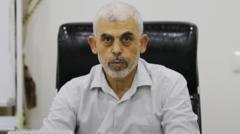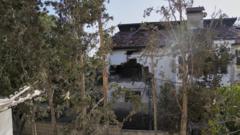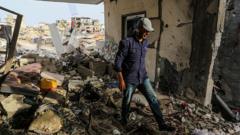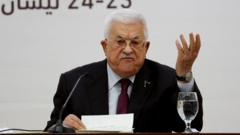Ashraf Abo Taha, who lived in the house where Yahya Sinwar was killed, shares his shock and sorrow over the loss of his home, emphasizing the plight of Gazans amid ongoing conflict. His experience reveals the intersection of personal tragedy and the larger humanitarian crisis in the region.
After Sinwar’s Death, a Gaza Family Reflects on Loss and Displacement

After Sinwar’s Death, a Gaza Family Reflects on Loss and Displacement
A Palestinian man in Gaza recounts the destruction of his home where Hamas leader Yahya Sinwar was killed by Israeli forces, exposing the broader consequences of conflict on local civilians.
In a haunting account shared with the BBC, a Gaza resident named Ashraf Abo Taha revealed that the house where Yahya Sinwar, a prominent Hamas leader, was killed by Israeli forces on October 16, was once his home for 15 years. Like many in Rafah, Abo Taha fled his residence in May amid an intensive Israeli military operation against Hamas, losing contact with the fate of his home.
Upon seeing footage of Sinwar's final moments, Abo Taha was shocked to recognize the partially destroyed building as his own, capturing a stark representation of the housing crisis caused by the ongoing conflict. Initially skeptical of the claim made by his daughter via social media, his suspicions were confirmed by his brother—leading him to confront the reality of what had happened to the place he built with his siblings.
The footage released by the Israeli military was analyzed by BBC Verify, which matched the defining features of Abo Taha's home, such as unique window archways and the distinctive decorations around the doorway. The toll of Israeli airstrikes on Rafah during May raised international concerns, resulting in a massive exodus of Palestinian families, many displaced multiple times.
Abo Taha described the emotional impact of losing his home, which he had invested approximately 200,000 shekels (£41,400) to build. The memories associated with the house—the orange sofas, his mother's casserole dish—underscore the profound loss felt by families in conflict zones. As he reflects on the irreparable damage to his home and the uncertainty of his future, he voiced a sentiment echoed by many: “Only God can compensate us.”
While Sinwar's death has raised questions about Hamas's leadership, the broader consequences of the conflict continue to resonate in the lives of everyday Gazans like Abo Taha, highlighting the urgent need for humanitarian solutions amid ongoing strife.


















